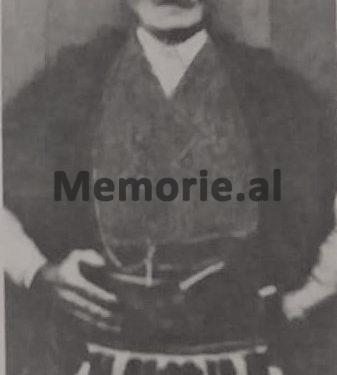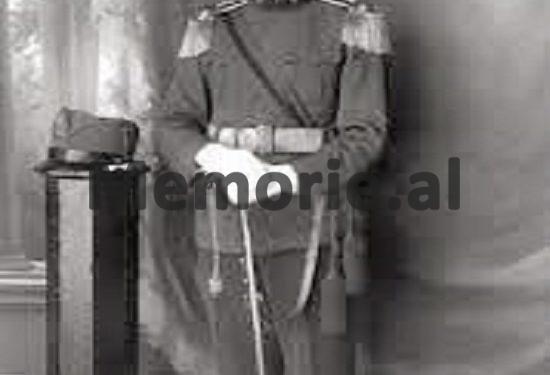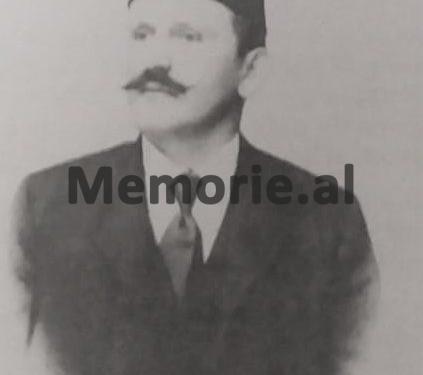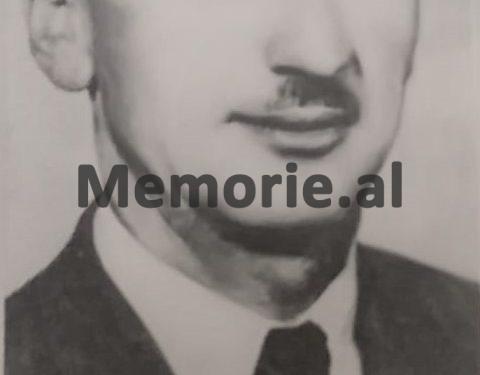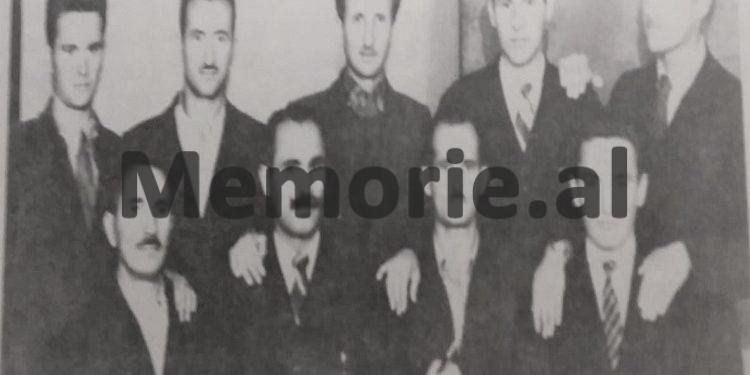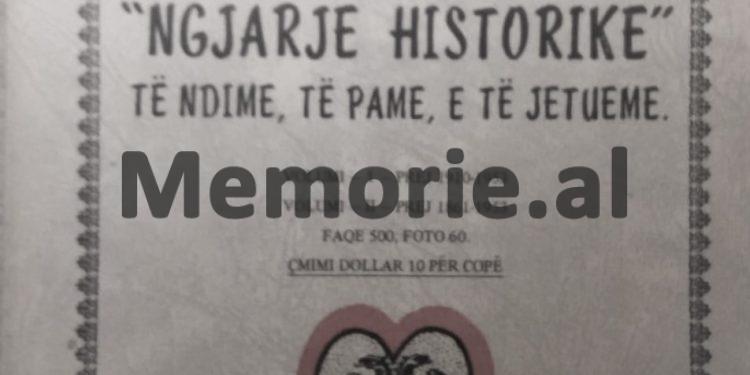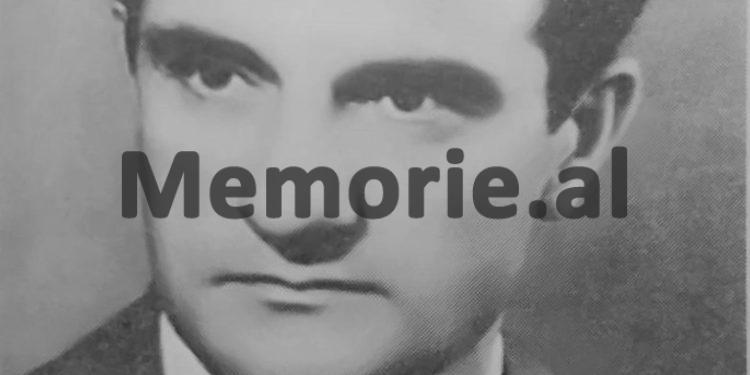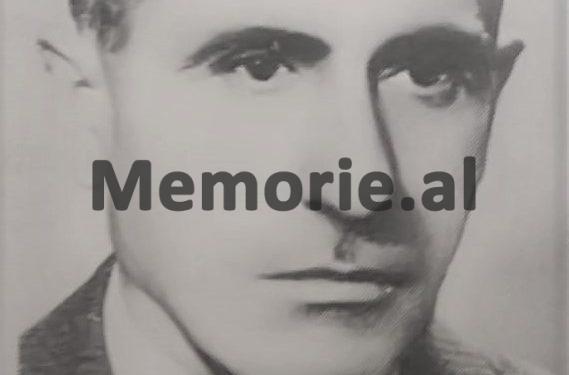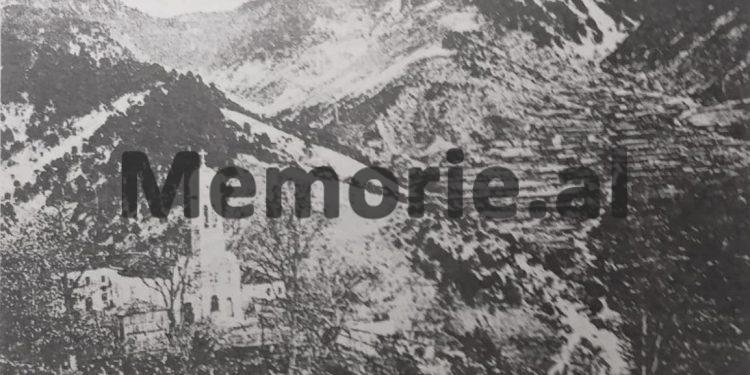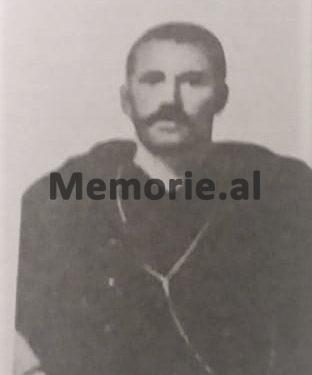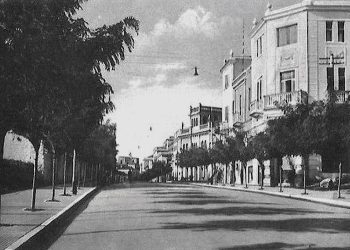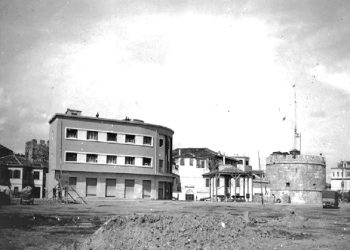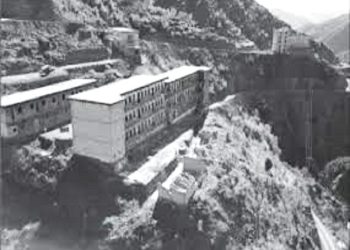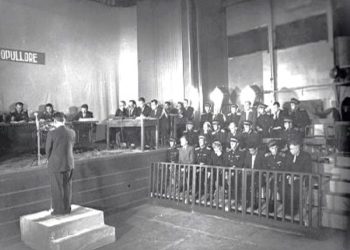Dashnor Kaloçi
Memorie.al publishes the unknown story of the event that took place on April 12, 1950 in the place called Ujë Lurth in the province of Mirdita, where a group of anti-communist resistance, consisting of: Preng Dod Gjini, Mark Mëlyshi, Luk Prend Zefi, Ndre Mark Nika, Ndue Lala, Pjetër Gjini, Nikoll Jaku, Mark Jak Lurthi, Preng Marka Brozi and Gjin Kros Buna, were surrounded by special units of the Prosecution Forces that were under the orders of the chairman of the Internal Affairs Branch of Mirdita district , Captain Sul Manoku, and after six hours of armed struggle between them, six members of the anti-communist resistance group were killed, while four others were able to break through the siege and leave. The whole unknown story of that event that terrorized Mirdita, after the six dead bodies of Gjin Kros Buna, Preng Dod Gjini, Preng Zef Tarazi, Nikoll Deda and Pal and Mark Mëlyshi, were left for a few days in the center of Rrëshen, where the people forcibly gathered and massacred the corpses by cursing them, spitting them with kicks and stones, (then they were buried on the bank of the river Zme, so that when the river came in the winter, it would take them as well to leave no burial mark), was written by Captain Nikoll Mëlyshi, (the book “Historical Events” to help, see and live ‘. 5571 GRANDY, DETROIT, MICH. 428211 USA 1976), one of the leaders of the anti-communist resistance , who after staying for several years on the run in the mountains of Mirdita and other northern provinces of Albania, was able to escape and settle as a political asylum in the US.
It was December 29, 1949, when the Anglo-Americans decided to land the second group of paratroopers landing in the mountains of Mirdita, who had been trained at their secret bases in Italy, Malta and Greece. These groups consisted mainly of elements from the areas of Northern Albania, well-known nationalists and anti-communists, who had left the country in late 1944 and early 1945, where most of them were from families of legalists who in during the Monarchy, they had served in the Albanian National Army, known for their loyalty to King Zog.
According to the testimony of Nikoll Mëlyshi, one of the leaders of the anti-communist resistance, former captain of the Zog Monarchy and also during the occupation of the country a member of the staff of the VII Partisan Brigade of the National Liberation Army of Enver Hoxha, which at that time commanded by Gjin Marka Toma, the landing of the second parachute groups in Mirdita, encouraged small anti-communist groups, operating mainly in the highlands of Mirdita, Puka, Lura and Dukagjini, in the North of the country, which had suffered casualties and great losses in human lives, after the failure of the Postriba uprising.
After these landings, many anti-communist resistance forces intensified their actions, which until then, due to the harsh winter of that year, had been dragged into caves, away from the inhabited centers, where the government forces of the Defense Division were deployed, which which led to many new escapes and the rise of anti-communist resistance groups.
Grouping of anti-communist leaders in Kthella Water of Mirdita
After the landing of these groups, some leading leaders, well-known anti-communist exponents from the province of Mirdita and its suburbs who had been on the run since 1945, decided to gather to organize by gathering in a place called Uje Kthella, a meeting point that presented security for its own mountainous terrain. The anti-communist leaders who gathered there were: Preng Dod Gjini, Mark Mëlyshi, Luk Prend Zefi, Ndre Mark Nika, Ndue Lala, Pjetër Gjini, Nikoll Jaku, Mark Jak Lurthi and Preng Marka Brozi. On the same day, this group was joined by Gjin Kros Buna, who was known as one of the most determined anti-communists, who had broken through several sieges of the Pursuit Forces and often damaged them.
Gjin Kros Buna was known throughout the area as a “hardy hero” and had become the terror of the communists as he had crossed the state border several times, both in the North with Yugoslavia and in the South with Greece, so much so that it was said that crossed the state border like the fence of his own house. After meeting together at a place called Ujë Kthellë, they decided to spend Easter week in that deserted forest, with as little food as they could get from the few different bases they had left. Their movement in that area was very limited, because they were located near the village of Sheba, a village mainly very close to the communists, so much so that the one from the resistance forces was contemptuously called “Little Moscow” of Kthella.
According to the memoirs of Nikol Mëlyshi, on April 8, 1950, on Saturday, which was also called Great Saturday, because it was a day before Easter, near the forest where the fugitives were staying, the passage of some livestock. The guards of the group patrolling at a distance not too far from the place where the main leaders of the resistance had decided to spend Easter week, saw their movements and secretly approached you, grabbed their shepherd and sent him to the group. “Çobani”, was from the village of Ujë-Lurth and he was very well known by some members of the group, who was not a shepherd, but a man of the State Security who many times according to the task given to him took the cattle and went out to the mountains to detect movements of the anti-communist resistance forces operating in those parts and to inform at the center of the sub-prefecture, the chairman of the Internal Affairs Branch, Suljeman Manokun.
The shepherd’s being an informant was well known for a long time by Gjin Kros Buna, who wanted to shoot him on the spot that day, but he changed his mind and forced him to reveal his connections and all relations with the Security. Çobani After sitting about four hours in front of Prenga, Markut, Luka and others, “Çobani” was forced to show all the connections he had with the State Security and that he was obliged to do so, to report to the Branch Interior, for any suspicious movement he would see.
After that, an agreement was made between him and the group by concluding a pledge that “Çobani” would not tell the Security about what he had seen for the three days of Easter. This was done so that he too was free to go, defending both parties for those three days of feasting. The “Shepherd” kept his word, until the third day of Easter and the fourth day; he went to the head of the Branch, Sulejman Manoku and told about the 13 fugitives, who were in the place called Ujë-Kthellë.
Captain Sulejman Manoku, surrounds 13 anti-communist leaders!
According to the testimony of Captain Nikoll Mëlyshi, that same evening after “Çobani” was left free to go, Pjetër Gjini and Nikolë Jaku, separated from the center group and went in different directions, to perform some services assigned to them by Preng Dod Gender with Gjin Kros Buna, the two main members of the group. Ndue Lala would also go to his region in the province of Kurbin, (Mal Bardhë), where he had his house, to perform a service and provide a quantity of supply for the group. (Ndue Lala, passed away in July 1995, speaking during an activity in the hall of the Academy of Arts in Tirana, the day of the establishment of the Association of Democratic Politically Persecuted, after returning from long exile in the US).
That night when Ndue Lala left the group and left for Kurbin, he was accompanied by Pal Mëlyshi and Mark Lurthi. After escorting Ndu to his region, the two returned to the center of the group, two hours before dawn. The 10 people who remained there, had to spend the day of April 12 in the same place, as they planned to make a long trip, where they would meet Pashko Suma, a well-known exponent of the anti-communist resistance, with whom would discuss to begin preparations, for another parachute landing in Kthella.
On the night of April 11, after receiving information from his man, the Chief of Security of Mirdita, Captain Sul Manoku, prepared the active forces of the Pursuit Brigade (approximately 300 soldiers) and under the command of “Shepherd”, were starts in the direction of the place where all 10 members of the group were. That same night, Sul Manoku and his forces surrounded the whole country (in three sieges) and when the day of April 12 dawned, all 10 members of the group saw themselves surrounded on four sides.
The group’s guards observed the movements of soldiers who had approached at a distance of approximately 200 meters from the group. The forces of the Pursuit Brigade made the siege at such a close distance, because their informant (“Çobani”) knew the place very well, both day and night, as he lived there most of the time. One of the guards of the group, after seeing the movements of a soldier, immediately alerted all his comrades, waking them up and telling them that they were surrounded on all sides by army forces.
According to the memories of Captain Nikoll Mëlyshi, after this unexpected situation, the ten members of the anti-communist resistance group prepared quickly and in great silence avoiding any kind of noise and Gjin Kros Buna, Luk Zefi and Marka Jak Lurthi, were the first to occupy positions in the place called the Hills of the village of Lurth, while the others continued the preparations, getting ready to open fire. Before long, Gjini, Luka and Marku fell into a strong ambush of the Pursuit Forces and immediately a heavy fire was opened on them from all sides by the Pursuit Forces and so were they answered yes with dense fire.
The murder of Gjin Kros Buna and the breaking of the siege by Mark Jak Lurth!
Meanwhile it did not take long and from the exchange of fire, the bullets of the Pursuit Forces, have described Gjin Koros Buna on all parts of the body, leaving him dead on the spot. Mark Jak Lurthi, who was not far from him, did not see Gjin fall to the ground and approached him and when he saw that he was dead, he took his machine gun and was able to break the siege, firing without rest and escaped without any scratches. While Luk Prend Zefi, who was also close to Gjini, followed Mark and he was able to break the siege, but remaining wounded, in the left shoulder. While Marku and Luka broke the siege of the Pursuit Forces, Preng Dod Gjini, Mark Mëlyshi, Pal Mëlyshi, Preng Zef Tarazhi, Nikoll Deda, Ndue Marku and Preng Marka Brozi, continued the resistance, firing automatic weapons and throwing from time to time to them even hand grenades.
The siege was very strong, with about 300 effective soldiers of the Pursuit Forces, surrounded by seven members of the anti-communist resistance group, who refused to surrender alive at all, although hopes of getting out of that siege were almost slim. The armed struggle continued strictly for about five hours in a row and at that time he was wounded by a bullet in his position, Preng Marka Brozi and shortly after him, Preng Zef Tarazhi remained dead. After Taraz’s murder, the bullets also described Nikoll Deda, leaving him dead.
According to the testimony of Nikoll Mëlyshi, Preng Marka Broz was carrying the wounded man on his back, Mark Mëlyshi, who at one point, had a face-to-face fight with two soldiers of the Pursuit Forces, having behind him, his uncle’s son, Pal Mëlyshi. While Preng Dod Gjini and Ndue Marku were attacking, firing to break through the siege, the bullets described Mark Mëlyshi, who fell to the ground, with Preng Brozin wounded in the back. At the same time that Mark Mëlyshi was shot to death, Paul was seriously injured and, looking for no other way of escape, pulled the pistol from his belt and shot himself in the head, with a bullet, leaving him dead.
Paul fell to the ground not far away next to his Uncle Mark’s son, who was also his age. Meanwhile, Preng Marka Brozi, so wounded, was able to get out of the siege, escaping from the Pursuit Forces also because he knew very well the rugged terrain where he was. According to the testimony of Ndue Lala, “Mark Mëlyshi and his uncle’s son Pali had the opportunity to break the siege and leave unharmed, but they wanted to take Preng Marka Broz, who was wounded, and not “they left him alive in the hands of the Pursuit Forces, they remained in the fire and both were killed.”
The murder of Preng Dod Gjini and the sending of corpses to Rrëshen for terror!
Not long after the assassination of Paul and Mark Mëlyshi, at a distance of a few meters away from them, the bullets penetrated the body of Preng Dod Gjini, one of the main leaders of the group, who remained dead on the spot. At that time after the murder of Prenga, Ndue Mark Nikolli, (from Dibri of Mirdita) who was not far from him, seeing almost all his friends, dead, did not know what to do, before and could enter a cave, which was near a cliff that fell knife on the stream and sat there for a long time, listening very closely to the voices of the soldiers of the Pursuit Forces, who were not far from him.
At the end of the armed struggle that lasted about six hours, the Pursuit Forces kept under surveillance the six bodies of those killed and in various forms, combed the whole country, to follow in the footsteps of four other members of the group, who were able to break the siege. After all the control of the country has been done, the Pursuit Forces have gathered the inhabitants of the village of Lurth and those around it who have approached them at the place where the attempt was made with the anti-communist resistance group. After that, they forced a part of them to collect the six corpses (with vig) which they sent to the center of Rrëshen, on the bank of the river Zmës. Only after the departure of the Pursuit Forces, Ndue Mark Nikolli, came out of the cave and left without being spotted by them.
Meanwhile, the six corpses, cut and sifted by bullets, were smashed to the ground, on the bank of the river Zmesa, and there they gathered all the people of the area, forcing some of them to spit on the corpses, shooting them with kicks and stones. Likewise, from the main leaders of the Mirdita Party Committee, several speeches were made in front of the corpses, exposing them. According to the memories of Nikoll Mëlyshi, the most severe of all, he was insulted and kicked and stoned and also the body of Pal Mëlyshi was spat upon, calling him a traitor.
This is because Paul, before fleeing to the mountains to join the anti-communist resistance forces, had served in the Communist Party for several years, serving in the Great Highlands as a party instructor. Meanwhile, the communist leaders of the province of Mirdita had carried out their mission and the passage near those lifeless bodies had become impossible, as nothing was seen there, except a few piles of meat sifted by bullets. But deliberately, those corpses were left there for several days, terrorizing the people, so much so that crossing there became impossible due to the heavy wind that was felt far away.
After a few days of staying there, by the senior communist leaders of the Mirdita Party Committee, some villagers were ordered to form a large group on the bank of the Zme River and the six corpses were thrown into that pit of common, there by the river. The great pit that was covered with earth was made there by the river, that when the great river flowed in the winter, it might take away their bones, so that not a trace of their grave would be left.
The whole description of those events that took place at the end of 1949 and the beginning of 1950 in the mountains of Mirdita, as well as the armed attempt on April 12, 1950, (Easter day), between the anti-communist resistance group and the Forces of The following, where the following were killed: Gjin Kros Bunga, Preng Dod Gjini, Preng Zef Tarazhi, Nikoll Deda and Pal and Mark Mëlyshi, was written by Nikoll Mëlyshi in his book entitled: “Historical Events” to help, see and jetueme ‘. (5571 GRANDY, DETROIT, MICH. 428211 USA 1976), based on the written testimonies of Ndue Lala and Luk Prend Zefi, who survived that effort and were able to escape from Albania and emigrate to the USA, where lived for many years as political asylum seekers in New York. Memorie.al







